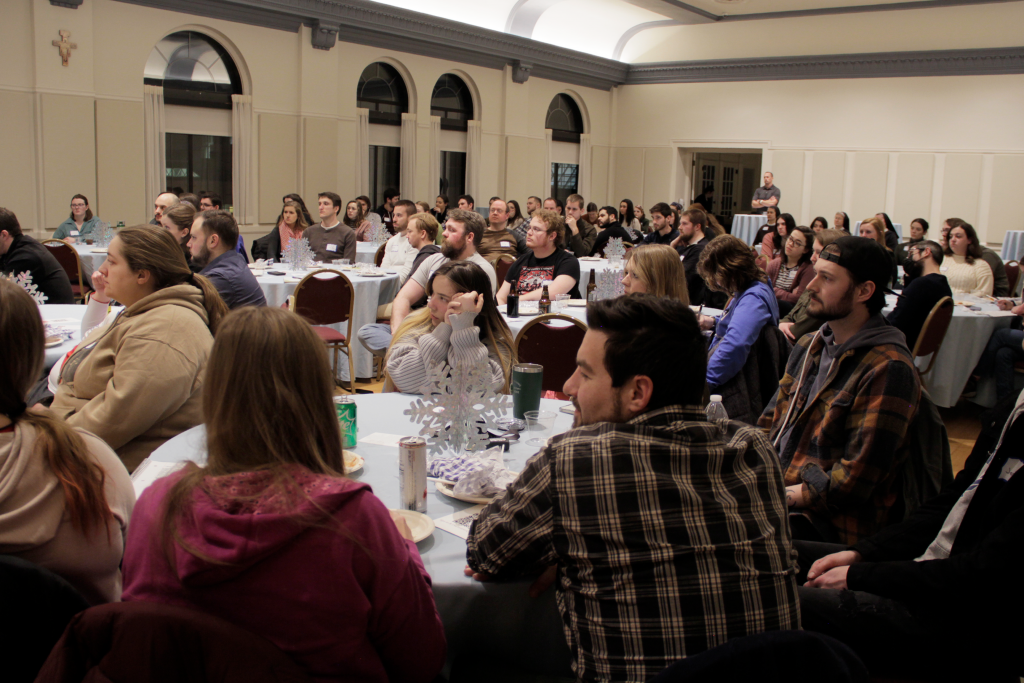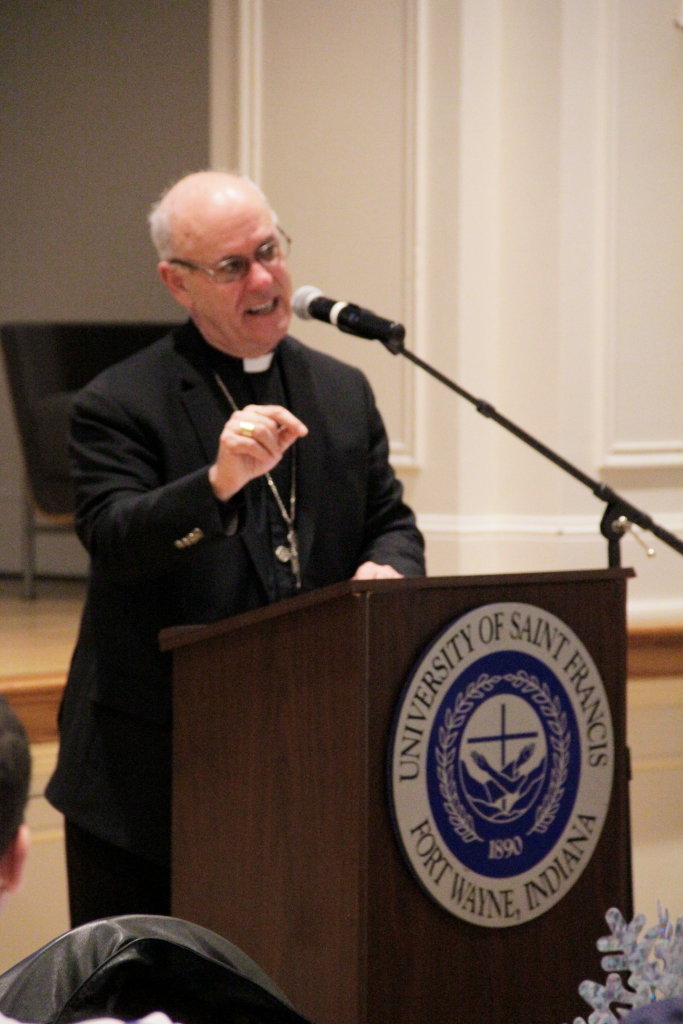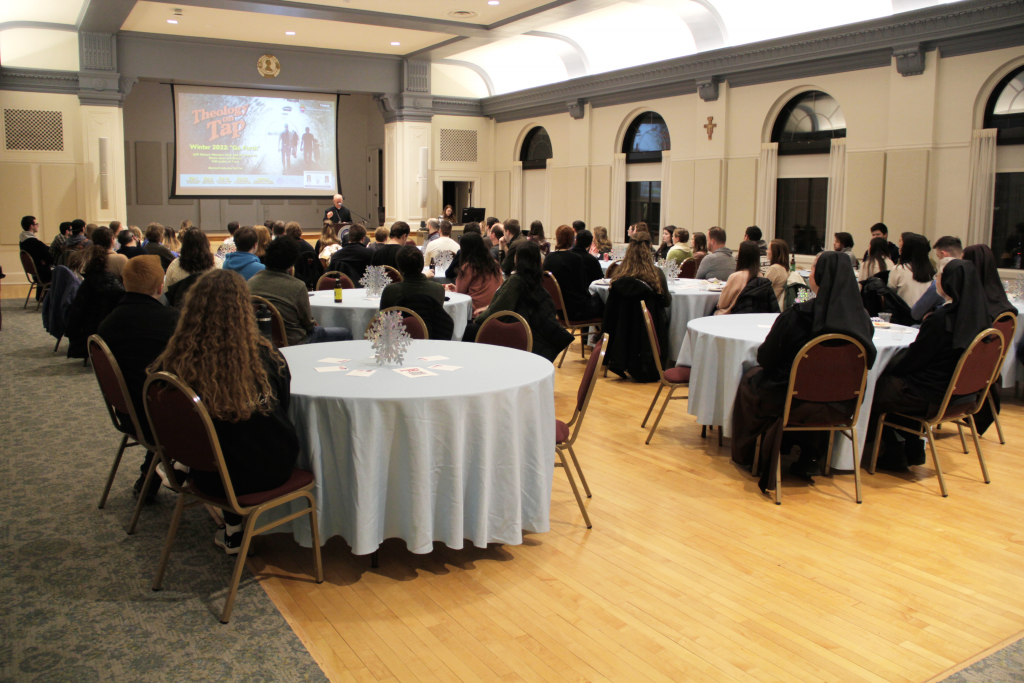February 18, 2022 // Bishop
Bishop upholds importance of Eucharist to young adults
On the second night of the 2022 Theology on Tap winter series, Bishop Kevin C. Rhoades was invited to speak to young adults about the real presence of Jesus Christ in the Eucharist. This Theology on Tap series, entitled “Go Forth,” is a weekly event held on Tuesday evenings at the Historic Woman’s Club located in the downtown campus of the University of Saint Francis in Fort Wayne.
Before beginning his presentation, Bishop Rhoades reminded the young adults in attendance about the National Eucharistic Revival, a three-year movement of the U.S. Conference of Catholic Bishops meant to deepen Catholics’ faith in the Real Presence, and how the Diocese of Fort Wayne-South Bend will participate in it. At the end of the three-year revival, a National Eucharistic Congress will be held in Indianapolis July 17-21, 2024, the first in nearly 50 years, welcoming thousands of Catholics for a pilgrimage to “together personally encounter Jesus in the Eucharist” and take the encounter back into the world, according to the National Eucharistic Revival website.
The diocese will partake in the National Eucharistic Revival with a eucharistic procession and festival of its own. On June 19 of this year, Warsaw will act as the central location between Fort Wayne and South Bend, said Bishop Rhoades, drawing together members of the diocese from its farthest reaches. There, a prayer service and music will begin at 2:30 p.m., with the eucharistic procession beginning 30 minutes later. The 2.8-mile-long processional journey will begin at Sacred Heart Parish, stop for prayer and a eucharistic blessing in Central Park and end at Our Lady of Guadalupe Parish where Benediction and the festival will be celebrated. The diocese requests participants register in advance.
Beginning his talk entitled “The Eucharist: Presence, Sacrifice, Communion,” Bishop Rhoades expressed his personal love for the Eucharist to the audience. His episcopal coat-of-arms, he explained, displays rays of light encompassing a eucharistic host. Furthermore, 2004, the same year he was ordained a bishop, St. John Paul II deemed as the Year of the Eucharist.
“The Eucharist is a mystery of faith,” the bishop stated. “The Eucharist contains the Church’s mystery of faith, and the faithful announce this central truth of the faith. We are called to conform our lives to this mystery.” And because it is indeed a mystery, the Eucharist “greatly surpasses our understanding,” he noted.
With that in mind, the bishop also addressed the sad reality that this mystery is not embraced by all Christians or even all Catholics. He explained that one of the reasons for this lack of faith is an acute reliance upon rationalism, which he explained as knowledge of only what one can experience with one’s own senses.
The bishop further clarified, “I think it is important to recognize that reason does have a part to play in growing in our understanding of the Eucharist. As Catholics, we’re never just ‘faith alone.’” He continued, “Without faith, we can’t rise to the truth about the Eucharist. But this faith is not irrational. It transcends reason – it doesn’t just reject it.”
Bishop Rhoades referenced St. John Paul II’s analogy of the healthy relationship that faith and reason hold, in which the two attributes are likened to “two wings on which we can rise to the contemplation of truth.” Faith and reason, therefore, work together.
Later, the bishop explained how transubstantiation plays into this relationship between faith and reason because the process “is above reason, but not against reason. The Eucharist is something entirely supernatural. It’s a miracle. But it is not contradictory or impossible.” Transubstantiation is the process by which ordinary bread and wine are changed into the body and blood of Jesus Christ while still maintaining the appearance of ordinary bread and wine.
Finally, Bishop Rhoades spoke on the heart and namesake of his talk: the three eucharistic aspects of presence, sacrifice and communion as they relate to the mystery of the Eucharist. The bishop explained the mystery of presence as Christ’s intention, through His institution of the Eucharist, to continue to abide among His beloved disciples even though His bodily ascension was imminent. Through this mystery, He also lives among the faithful through the generations as the sacrament is celebrated and offered at every Mass.
The bishop relayed the meaning of the mystery of sacrifice as the realization of Christ’s death on the cross for His beloved Church – quite literally, the sacrificial giving of His very flesh and blood to save His faithful from sin.
Lastly, Bishop Rhoades explained that the mystery of Communion relates to how the reception of the Eucharist allows the faithful to physically hold Christ within themselves upon consumption, as well as to spiritually undergo the effects of “sanctifying grace, charity and the indwelling of the Trinity.” Furthermore, the bishop noted that the sacrament “binds us into one body by strengthening our unity with Christ and with one another.”
Bishop Rhoades concluded his talk to the young adults with encouragement: “May this great mystery of love be the center of our lives, and may we bear witness to it as true disciples of our eucharistic Lord!”
As with every Theology on Tap session, young adults were given conversation questions following the talk and discussed such ideas as what it means to “live the Eucharist,” as well as how presence, sacrifice and communion correlated with the upcoming Eucharistic Revival.
More details concerning the diocese’s procession and festival, as well as information regarding the National Eucharistic Revival, can be found on the diocese’s website at diocesefwsb.org/eucharist/.
The best news. Delivered to your inbox.
Subscribe to our mailing list today.









